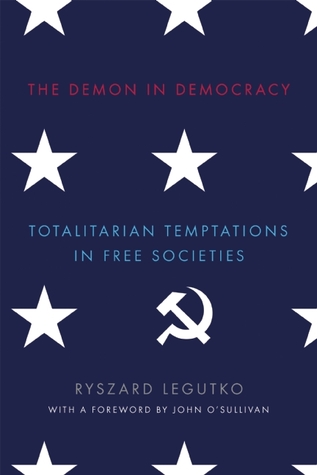If Ryszard Legutko is correct, there is increasingly little difference between the devil we know and the devil we don’t. He makes a compelling case for this claim. The totalitarian temptation, regardless of differences in time, place, and ideology, is ever present. The fact is especially troubling as modern man is aided by unprecedented technological means. Legutko, a professor of philosophy at Jagiellonian University in Kraków and member of the European Parliament, once lived under the boot of communism. As a member of Poland’s Solidarity trade union in the early 1980’s, he was astonished at the ease with which former communists became “eloquent accoucheurs of the new system.” Not content merely to acknowledge the phenomenon, Legutko investigated it. This book—a work of political philosophy that reads like a page-turning thriller—is the result.
Legutko arranges his material thematically—history, utopia, politics, ideology, and religion—as he traces democracy from its ancient roots through various of its manifestations to the modern age, highlighting the triumphant (and myopic) claim proffered by its uncritical devotees that democratic government is the culmination of man’s political aspirations and the exclusive organizing principle for Progress. He traces liberalism from the earlier aristocratic variety to its modern egalitarian manifestation. Though Legutko paints with a broad brush, he offers specific examples taken from politics, philosophy, psychology, and economics to illustrate and buttress his thesis. He identifies the upheaval of the 60’s, rooted deeply in the ideas preceding it, as the confluence of liberalism and democracy, transforming both and resulting not in the liberalization of democracy but in the democratization of liberalism. The effect, as we plainly see today, is that “the spectrum of political acceptability” has become “distinctly limited.” Such is the coercion to freedom in liberal democratic regimes of the West.
Legutko outlines a new political future for the West, particularly Europe, one that is neither liberal nor democratic, informed by a new ideology of the rights of man but delivering the same totalitarianism.
In his chilling assessment of the development of liberal democracy after the demise of communism in Europe, Legutko examines the arresting similarities between regnant liberal democracies of the West and the Soviet-style communism he lived under for many years. “[C]ommunism and liberal democracy,” he argues, “have a strong tendency to ideology.” Both are closed ideological systems that, while differing in tactics, have the same strategic goal: the saturation of all aspects, institutions, and organizations of private and public life.
Citing the example of Poland after the fall of communism, he writes, “The required attitude of a newly liberated nation was not that of creativity, but conformity.” Thus liberal democracy was the only acceptable replacement for communism. Legutko asserts that both systems
enforced the liquidation—through revolutionary means in communism, evolutionary in liberal democracy—of social hierarchies, customs, traditions, and practices that had existed prior to the emergence of the new political system.
Anyone who opposes the liberal democratic regime is condemned to “moral degradation, merciless criticism, and ultimately, historical annihilation.” Hyperbole? Hardly. Americans have been told for years now that we will end up on the “wrong side of history” if we reject the progressive agenda that passes for the exclusive interpretation of liberal democracy here. As Professor Legutko has it, “Once one sends one’s opponents to the dustbin of history, any debate with them becomes superfluous.”
Legutko’s point is that violent Soviet-style tactics are unnecessary to effect liberal democracy’s goal of societal saturation. It is enough that the utopian vision of liberal democrats, like that of the communists, aided by the unrelenting ideological mantra of equality and its offspring multiculturalism and political correctness, will inexorably lead to “man’s integration with the regime and the regime with the man,” thereby achieving what the communists could not.
This is all the more remarkable when we consider that liberal democracy—unlike communism, which permeated every aspect of society from the top down—is devoid of a center of control and official guardians. This fact, Legutko argues, “paradoxically, makes the overarching nature of the system less tangible, but at the same time more profound and difficult to reverse.” In a Gramscian spin on liberal democracy, “the people themselves . . . have eventually come to accept, often on a preintellectual level, that eliminating the institutions incompatible with liberal-democratic principles constitutes a wise and necessary step.”
Legutko offers as a subtle example of the leveling effects of liberal democracy the paradigmatic shift in the conceptual understanding of dignity. Once an attribute that “ennobled those who acquired it” and that could be forfeited by undignified behavior, “dignity” has been reimagined in the last century as an “inalienable right.” Legutko argues that the modern understanding of dignity lacks classical metaphysical underpinnings, that it is tenuous and therefore difficult to justify. Following the 1948 Universal Declaration on Human Rights, he says, “dignity has no longer been about obligation, but about claims and entitlements.”
Most disturbingly, when traditional authority structures are stripped away and liberal democracy (as the European Union demonstrates) is viewed as the culmination of European history and the final political system, we are left with a Rousseauian fantasy: an all-governing but ungovernable general will. Yet Legutko ominously notes that “The liberal-democratic general will reaches the area that Rousseau never dreamt of—language, gestures, and thoughts.” The ubiquity of this ideologically driven general will drags us further still from reality.
[The Demon in Democracy: Totalitarian Temptations in Free Societies, by Ryszard Legutko, translated by Teresa Adelson (New York: Encounter Books) 192 pp., $23.99]

Leave a Reply